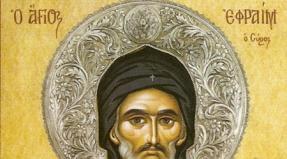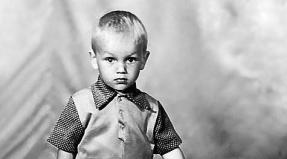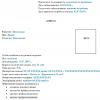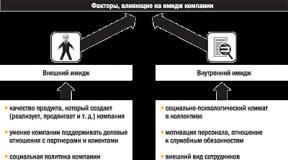Rules for addressing clergy. What is holiness, or can a moral person be called a saint? What is the name of the priest in the church
Hieromonk Aristarkh (Lokhanov)
With the blessing of His Grace Simon, Bishop of Murmansk and Monchegorsk
General information about church etiquette
The years of militant atheism in our country, which eventually led to historical and religious oblivion, interrupted many traditions that held together generations, imparting sanctification to life through loyalty to age-old customs, traditions, and institutions. Lost (and now only in parts and with difficulty is restored) what our great-grandfathers absorbed from childhood and what later became natural - the rules of behavior, courtesy, courtesy, permissiveness, which have developed over a long time on the basis of the norms of Christian morality. Conventionally, these rules can be called church etiquette. In general, etiquette is a set of rules of behavior, behavior adopted in certain social circles (they distinguish between court, diplomatic, military etiquette, and also general civil etiquette), and in a figurative sense - the very form of behavior. The specificity of church etiquette is primarily associated with what constitutes the main content of the religious life of a believer - with reverence for God, with piety.
To distinguish between the two terms - piety and church etiquette- let us briefly touch on some of the basic concepts of moral theology (according to the course "Orthodox moral theology" of Archimandrite Plato. -, 1994).
Human life takes place simultaneously in three spheres of being:
- natural;
- public;
- religious.
Possessing the gift of freedom, a person is oriented:
- on one's own being;
- on an ethical attitude towards the surrounding world;
- on a religious attitude towards God.
The basic principle of a person's relationship to his own being is honor (indicating that there is a person), while the norm is chastity (individual inviolability and inner integrity) and nobility (a high degree of moral and intellectual formation).
The basic principle of a person's relationship to his neighbor is honesty, while truthfulness and sincerity are the norm.
Honor and honesty are the prerequisites and conditions for religious piety. They give us the right to boldly turn to God, realizing our own dignity and at the same time seeing in another person a companion to God and a co-heir of God's grace.
Exercise in piety (see:), prosperity in it (see:) must be subordinated to the whole life of a believer, who is called to remain spiritually sober and not deceive his heart, risking falling into empty piety (see:).
Piety is like a vertical, directed from earth to heaven (man<->God), church etiquette is horizontal (man<->Human). At the same time, one cannot ascend to heaven without loving a person, and one cannot love a person without loving God: If we love each other, then God dwells in us(), and He who does not love his brother whom he sees, how can he love God, whom he does not see? ().
Thus, the spiritual foundations determine all the rules of church etiquette, which should regulate the relationship between believers striving towards God.
There is an opinion that "there is no need to be pretentious," since God looks at the heart. The latter, of course, is true, but virtue itself is offending if it is combined with repulsive manners. Of course, horrible intentions can be hidden behind a brilliant treatment, which is associated with the symbolic nature of our behavior, when, say, a gesture can reveal our true state or desire, but it can also hide. So, Pontius Pilate in one modern novel, washing his hands at the trial of Christ, gives such an interpretation to his gesture: "Let the gesture be elegant and the symbol flawless, if the act is dishonorable." Such abilities of people with the help of ambiguity of gesture, good manners of hiding a bad heart cannot serve as an excuse in the absence of church "good form". "Bad tone" in the church can become a stumbling block of a person with little church life on his way to God. Let us recall the groans and complaints of new converts who come to churches and meet there at times simply barbaric attitude towards themselves on the part of those who consider themselves to be churched. How much rudeness, primitive mentoring, hostility and unforgiveness can be found in other communities! How many people - especially young people and the intelligentsia - have been lost by the parishes because of this! And someday they, these departed people, will come back to the temple? And what answer will be given by those who served as such a temptation on the way to the temple ?!
God-fearing and church-raised. a person, if he sees anything indecent in the behavior of another, only corrects his brother or sister with love and respect. A case from the life of the monk is indicative in this respect: “This old man retained one habit from his worldly life, namely, sometimes he, sitting down, put one leg by the other, which might not seem entirely decent. Some of the brethren saw this, but none of them dared to reprimand him, because they all respected him greatly. But only one elder, Abba Pimen, said to the brethren: “Go to Abba Arseny, and I will sit with him as he sometimes does; then you make a comment to me that I am not sitting well. I will ask you for forgiveness; at the same time we will correct the elder as well ”.
They went and did so. The Monk Arseny, realizing that it was so indecent to sit for a monk, abandoned his habit "(Lives of the Saints. Month of May. Eighth day).
Politeness, as a component of etiquette, in a spiritual person can become a means of attracting the grace of God. Usually, politeness is understood not only the art of showing with external signs that inner respect that we have for a person, but also the art of being friendly with people for whom we have no disposition. What is this - hypocrisy, hypocrisy? For a spiritual person who knows the innermost dialectic of external and internal, politeness can become a means on the path of acquiring and developing humility.
The expression of one ascetic is known: do the external, but the Lord will give the internal for the external, for the external belongs to man, and the internal belongs to God. With the appearance of external signs of virtue, virtue itself gradually increases in us. Here is how the bishop wisely wrote about it:
“Whoever warns others' greetings with his greeting, expresses helpfulness and deference to everyone, prefers everyone to himself everywhere, silently endures various grievances and in every possible way strains mentally and practically and in self-abasement for Christ's sake, then at first he experiences many difficult and difficult minutes for personal pride.
But for the uncomplaining and patient fulfillment of the commandment of God about humility, the grace of the Holy Spirit is poured on him from above, softens his heart for sincere love for God and for people, and his bitter experiences are replaced by sweet ones.
Thus, actions of love without corresponding feelings of love are ultimately rewarded by pouring out heavenly love in the heart. The humbled person begins to feel in the people around him that he is in Christ and is disposed towards them with benevolence. "
The bishop wrote about this: "Acting in the church way, as it should, continuously goes through the science of reverence before God, with dedication to Him all."
In communion with people - both ecclesiastical and non-ecclesiastical - the holy fathers advise to remember that one must fight not against the sinner, but against sin and always give a person the opportunity to correct himself, remembering that he, having repented in the secret places of his heart, may be , already pardoned by God.
Thus, we see that, in contrast to secular etiquette, the rules of conduct in the church environment, being intimately connected with piety, lead to the purification and transformation of the heart by God's grace, which is bestowed on the laborer and striving. Therefore, church etiquette should be understood not only as a set of rules of conduct adopted in order to preserve the church organism, but also as a path of ascent to Christ.
To make this small guide easier to use, we have divided it into the following parts: Parish Code of Conduct; rules of conduct in monasteries; how to behave at a bishop's reception; the behavior of the Orthodox outside the church.
At the parish
When addressing the clergy, in order to avoid mistakes, it is necessary to have a certain minimum of knowledge about the priesthood.
In Orthodoxy, there are three degrees of priesthood: deacon, priest, bishop. Even before ordination to the deacon, the henchman must decide: whether he will pass the priestly service, being married (white clergy) or taking monasticism (black clergy). Since the last century, there has also been an institution of celibacy in the Russian Church, that is, ordination is accepted with a vow of celibacy (“Celibacy” is Latin for “single”). Celibate deacons and priests also refer to the white clergy. At present, monks-priests serve not only in monasteries, they are not uncommon in parishes, both in the city and in the countryside. The bishop must necessarily be from the black clergy. The priestly hierarchy can be represented as follows:
If a monk accepts a schema (the highest monastic degree is a great angelic image), then the prefix "schema" is added to the name of his dignity - schema monks, schema deacons, schema monks (or hieroschemons), schema-abbot, schema-archimandrite, schema-bishop (the schema-bishop must at the same time leave the control of the bishop ).
When dealing with the clergy, one should strive for a neutral style of speech. So, the address "father" (without the use of a name) is not neutral. It is either familiar or functional (typical for the address of clergymen among themselves: "Fathers and brothers. Attention please").
The question of in what form ("you" or "you") should be addressed in the church environment is decided unambiguously - to "you" (although we say in prayer to God Himself: "leave us", "have mercy on me" ). However, it is clear that in close relationships, communication goes to "you". And yet, when outsiders, the manifestation of close relationships in the church is perceived as a violation of the norm. So, the wife of a deacon or priest, of course, speaks at home with her husband in "you", but such an appeal to her in the parish hurts the ear, undermines the authority of the clergyman.
It should be remembered that in the church environment it is customary to handle the use of a proper name in the form in which it sounds in Church Slavonic. Therefore, they say: "Father John" (not "Father Ivan"), "Deacon Sergius" (and not "Deacon Sergei"), "Patriarch Alexy" (not "Alexei" and not "Alexy").
An appeal to the deacon
The deacon is the priest's assistant. He does not have that grace-filled power that a priest possesses and which is given in the sacrament of ordination to the priesthood. Because of this, a deacon cannot independently, without a priest, serve the liturgy, baptize, confess, unleash, marry (that is, perform the sacraments), service the funeral service, and consecrate the house (that is, perform services). Accordingly, they do not ask him to perform the sacraments and requirements and do not ask for a blessing. But, of course, a deacon can help with advice and prayer.
The deacon is addressed with the words: "Father deacon." For example: "Father deacon, can you tell me where to find the father of the abbot?" If they want to know the name of a priest, they usually ask in the following way: "Excuse me, what is your holy name?" (this is how you can address any Orthodox). If a proper name is used, then it must be preceded by "father". For example: "Father Andrey, let me ask you a question." If one speaks of a deacon in the third person, then one should say: "Father the deacon told me ...", or "Father Vladimir informed ...", or "Deacon Paul has just left."
Appeal to the priest
In church practice, it is not customary to greet a priest with the words: "Hello."
The priest himself, introducing himself, must say: "Priest (or priest) Vasily Ivanov", "Archpriest Gennady Petrov", "Hegumen Leonid"; but it would be a violation of church etiquette to say: "I am Father Mikhail Sidorov."
In the third person, referring to the priest, they usually say: "The Father Superior blessed", "Father Michael considers ...". But it hurts the ear: "Priest Fyodor advised." Although at a multi-clerical parish, where priests with the same names may appear, they say to distinguish them: "Archpriest Nicholas is on a business trip, and Priest Nicholas is giving communion." Or, in this case, the surname is added to the name: "Father Nikolai Maslov is now at Vladyka's reception."
The combination of "father" and the surname of the priest ("Father Kravchenko") is used, but it rarely carries a tinge of formality and aloofness.
Knowledge of all this is necessary, but sometimes it turns out to be insufficient due to the multi-situational nature of parish life. Let's consider some situations. What should a layman do if he finds himself in a society where there are several priests? There can be many variations and subtleties here, but the general rule is as follows: they take the blessing first of all from the senior priests, that is, first from the archpriests, then from the priests. If you have already taken a blessing from two or three priests, and there are three or four other priests nearby, take a blessing from them. But if you see that this is somehow difficult, say: "Bless, honest fathers" and bow down. Note that in Orthodoxy it is not customary to use the words: "holy father", they say: "honest father" (for example: "Pray for me, honest father").
Another situation: a group of believers in the courtyard of the temple comes up to the blessing of the priest. In this case, you should do the following: first, men come up (if there are clergymen among the audience, then they come first) - by seniority, then women (also by seniority). If a family is suitable for the blessing, then the husband, wife, and then the children (by seniority) come first. If they want to introduce someone to the priest, they say: “Father Peter, this is my wife. Please bless her. "
What should you do if you met a priest on the street, in transport, in a public place (in the mayor's office, shop, etc.)? Even if he is in civilian clothes, you can go up to him and take his blessing, seeing, of course, that this will not interfere with his work. If it is impossible to take the blessing, they are limited to a slight bow.
At parting, as at a meeting, the layman again asks the priest for blessing: "Forgive me, father, and bless."
Greetings from the laity
Because we are one in Christ, believers call each other "brother" or "sister." These appeals are quite often (although, perhaps, not to the same extent as in the Western branch of Christianity) are used in church life. This is how the faithful address the entire congregation: "Brothers and sisters." These beautiful words express that deep unity of believers, about which it is said in the prayer: "But all of us from the one Bread and Chalice of those who commune, unite to each other in the One Spirit, Holy Communion." In the broadest sense of the word, both the bishop and the priest are also brothers for the layman.
In the church environment, it is not customary even to call the elderly by their patronymic, they call only by their first name (that is, the way we approach Communion, to Christ).
When lay people meet, men usually kiss each other on the cheek simultaneously with a handshake, while women do without a handshake. Ascetic rules impose restrictions on the greetings of a man and a woman through kissing: it is enough to greet each other with a word and tilt of the head (even on Easter, rationality and sobriety are recommended, so as not to bring passion into Easter kissing).
Relations between believers should be filled with simplicity and sincerity, humble readiness, if wrong, to immediately ask for forgiveness. Small dialogues are typical for the church environment: "Forgive me, brother (sister)." - "God will forgive, you forgive me." When parting, believers do not say to each other (as is customary in the world): "All the best!" .P.
If confusion often arises in the world: how to refuse something without offending the interlocutor, then in the Church this issue is solved in the simplest and best way: “Excuse me, I cannot agree to this, because this is a sin” or “Excuse me, but there is no blessing from my confessor for this ”. And in this way the tension is quickly relieved; in the world it would take a lot of effort.
Conversation behavior
The attitude of a layman to a priest as a bearer of the grace received by him in the sacrament of the Priesthood, as a person appointed by the hierarchy to shepherd a flock of verbal sheep, must be filled with reverence and respect. When communicating with a clergyman, it is necessary to ensure that speech, gestures, facial expressions, posture, and gaze are decent. This means that the speech should not contain expressive and even more rude words, jargon, which are full of speech in the world. Gestures and facial expressions should be kept to a minimum (it is known that stingy gestures are a sign of a well-mannered person). In a conversation, you cannot touch the priest, be familiar. When communicating, a certain distance is observed. Violation of the distance (being too close to the interlocutor) is a violation of the norms of even worldly etiquette. The pose should not be cheeky, let alone defiant. It is not customary to sit if the priest is standing; sit down after being asked to sit down. The gaze, which is usually the least subject to conscious control, should not be intent, studying, ironic. Very often it is the gaze - meek, humble, downcast - that immediately speaks of a well-mannered person, in our case, a church person.
In general, you should always try to listen to the other, without bothering the interlocutor with your verbiage and talkativeness. In a conversation with a priest, a believer must remember that the Lord Himself can often speak through a priest as a minister of the Mysteries of God. That is why parishioners are so attentive to the words of a spiritual mentor.
Needless to say, the lay people are guided by the same in their communication with each other; norms of behavior.
Communication by letter
Written communication (correspondence), although not as widespread as oral communication, also exists in the church environment and has its own rules. Once it was almost art, and the epistolary heritage of church writers or even ordinary believers now can only wonder, admire it as something unattainable.
The church calendar is a solid holiday. It is not surprising that the most widespread messages among believers are congratulations on the holidays: Easter, Christmas, patron saint, name day, birthday, etc.
Unfortunately, congratulations rarely go out and arrive on time. This is an almost universal omission that has become a bad habit. And although it is clear, for example, that Easter, the Nativity of Christ is preceded by a long, even exhausting fast, that the last days before the holidays are filled with troubles and many cares, - all this cannot serve as an excuse. We must make it a rule for ourselves: to congratulate and answer letters on time.
There are no strictly regulated rules for writing congratulations. The main thing is that congratulations should be sincere and breathe love. Nevertheless, some accepted or established forms can be noted.
Congratulations to Easter begins with the words: "Christ is Risen!" (usually in red ink) and ends with: "Truly Christ is Risen!" (also in red).
A congratulation letter might look like this:
Christ is Risen!
Beloved in the Lord N.! With a bright and great holiday - Holy Easter - I congratulate you and all your sincere ones. What a joy in my soul: "Christ for everlasting rebellion."
May this festive jubilation of the heart not leave you in all your ways. With love for the risen Christ - your M. Truly Christ is Risen!
Congratulations to Christmas can begin (there is no formula consecrated by the centuries, like in Easter) with the words: "Christ is born - praise!" ("Born" - in Slavic). This is how the irmos of the first song of the Christmas canon begins.
You can congratulate your loved ones, for example, as follows:
Christ is born - praise! Dear sister in Christ P.! My congratulations to you on the now-born Christ and prayer wishes to grow your whole life in Christ according to His age. How to cleanse the heart in order to come closer to the great piety mystery: “God appeared in the flesh!”?
I wish you the help of God-Infant Christ inyour godly deeds. Your pilgrim K.
When writing congratulations on the day of the namesake (that is, in memory of the saint of the same name with us), they usually want the help of the heavenly intercessor.
On the feast day, the whole parish is congratulated: the rector, the parishioners. If you want to address in a simple syllable, you can start like this: "Dear Father Superior (or dear priest) and all parishioners, I congratulate (s) ...".
If you want to use a more solemn and formal style, then the title should be different. Here you will need to remember the above table. The deacon, priest, hieromonk are addressed: "Your Reverend", to the archpriest, hegumen, archimandrite: "Your Reverend." The previously used address to the archpriest: "Your High Blessing" and the appeal to the priest: "Your Blessing" are used extremely rarely. In accordance with the appeal, all congratulations should be in a similar style.
This can also be guided when delivering a congratulatory speech, a toast on holidays, days of namesake, which are arranged quite often in strong parishes where they live as a single spiritual family.
At the table in the parish refectory
If you come at a time when the majority of those gathered are already at the table, then you sit in an empty seat, without forcing everyone to move, or where the abbot will bless. If the meal has already begun, then, asking forgiveness, they wish everyone: "An angel at the meal" and sit down in an empty seat.
Usually in parishes there is no such clear division of tables as in monasteries: the first table, the second table, etc. Nevertheless, at the head of the table (that is, at the end, if there is one row of tables) or at a table set perpendicularly, the abbot or the eldest of the priests sits. On the right side of him is the next oldest priest, on the left is the priest in rank. Sitting next to the priesthood is the chairman of the parish council, council members, clergymen (psalm reader, reader, altar boy), and singers. The abbot usually blesses the honored guests to dine closer to the head of the table. In general, they are guided by the words of the Savior about humility at dinner (see:).
The order of meals in the parish often copies the monastic one: if this is an everyday table, then the made reader, standing behind the analogue, after the blessing of the priest for the edification of the audience, loudly reads a life or admonition, which is listened to with attention. If this is a festive meal where birthday people are congratulated, then spiritual wishes and toasts sound; it would be good for those who wish to pronounce them to think in advance what to say. At the table, measure is observed in everything: in eating and drinking, in conversations, jokes, the duration of the feast. If the birthday person is presented with gifts, then these are most often icons, books, church utensils, sweets, flowers. At the end of the feast, the hero of the occasion thanks all those present, who then sing to him “many years”. Praising and thanks to the organizers of the dinner, all those who worked in the kitchen, also observe the measure, for "the Kingdom of God is not food and drink, but the joy of Holy Dus."
How to invite a priest to fulfill the requirements
Sometimes it is required to invite a priest to perform the so-called requirements.
If you know the priest, you can invite him over the phone. During a telephone conversation, as well as during a meeting, direct communication, they do not say to the priest: "Hello", but build the beginning of the conversation as follows: "Hello, is this Father Nikolai? Bless, father ”- and then briefly, succinctly informs the purpose of the call. They end the conversation with thanksgiving and again: "Bless." Either from the priest, or from the one standing behind the candle box in the church, you need to find out what needs to be prepared for the arrival of the priest. For example, if a priest is invited to give communion (admonish) a sick person, it is necessary to prepare the patient, clean the room, take the dog out of the apartment, have candles, clean boards, and water. For unction, you need candles, cotton pods, oil, wine. During the funeral service, candles, a prayer of permission, a funeral cross, a veil, an icon are required. Candles, vegetable oil, holy water are prepared for the consecration of the house. The priest who is invited for the service is usually impressed by the fact that the relatives do not know how to behave with the priest. Even worse, if the TV is not turned off, music is playing, a dog is barking, half-naked youth are walking around.
At the end of the prayers, if the situation permits, the priest can be offered a cup of tea - this is a great opportunity for family members to talk about spiritual matters and resolve any issues.
On the behavior of parishioners carrying church obedience
The behavior of parishioners carrying church obedience (trade in candles, icons, cleaning the church, guarding the territory, singing in the kliros, serving in the altar) is a special topic. It is well known what importance the Church places on obedience. Doing everything in the Name of God, overcoming your old man, is a very difficult task. It is further complicated by the fact that "getting used to the shrine" quickly appears, the feeling of the master (mistress) in the church, when the parish begins to seem like its own fiefdom, and hence - disregard for all "outside", "coming". Meanwhile, the holy fathers never say that obedience is higher than love. And if God is Love, how can you become like Him without showing love yourself?
Brothers and sisters carrying out obedience in churches should be an example of meekness, humility, gentleness, patience. And the most elementary culture: for example, to be able to answer phone calls. Whoever has had to call churches, knows what level of culture they are talking about - sometimes you don’t want to call anymore.
On the other hand, people going to church need to know that this is a special world with its own rules. Therefore, you cannot go to the temple in a provocative manner: women should not be in trousers, short skirts, without a headdress, with lipstick on their lips; men should not come in shorts, T-shirts, short-sleeved shirts, they should not smell of tobacco. These are questions not only of piety, but also of etiquette, because a violation of the norms of behavior can cause a fair negative reaction (even if only in the soul) from others.
All those who, for some reason, had unpleasant moments of fellowship at the parish - advice: you came to God, to Him and bring your heart, and overcome temptation with prayer and love.
In the monastery
The love of the Orthodox people for monasteries is well known. There are now about 500 of them in the Russian Orthodox Church. And in each of them, besides the inhabitants, there are workers, pilgrims who come to strengthen their faith, piety, to work for the glory of God on the restoration or improvement of the monastery.
The discipline in the monastery is stricter than in the parish. And although the mistakes of newcomers are usually forgiven, covered with love, it is advisable to go to the monastery, already knowing the beginnings of the monastic rules.
Spiritual and administrative structure of the monastery
The monastery is headed by the priest archimandrite - the ruling bishop or (if the monastery is stauropegic) by the Patriarch himself.
However, the abbot directly manages the monastery (it can be an archimandrite, abbot, hieromonk). In ancient times, he was called the builder, or abbot. The nunnery is run by the abbess.
In view of the need for a clear debugging of monastic life (and monasticism is a spiritual path, so verified and polished by centuries of practice that it can be called academic) in the monastery everyone carries a certain obedience. First mate and deputy governor - dean. He is in charge of all divine services, the fulfillment of statutory requirements. It is to him that they usually refer to the accommodation of pilgrims who come to the monastery.
An important place in the monastery belongs to the confessor, who spiritually nourishes the brethren. Moreover, this does not have to be an elder (both in terms of age and in terms of spiritual gifts).
From the experienced brethren are selected: the treasurer (responsible for keeping and distributing donations with the blessing of the governor), the sacristan (responsible for the beauty of the temple, vestments, utensils, keeping the liturgical books), the economist (responsible for the economic life of the monastery, in charge of obedience to the workers who came to the monastery), kelare (responsible for storing and preparing food), hotel (responsible for the accommodation and accommodation of guests of the monastery) and others. In women's monasteries, these obediences are borne by the nuns of the monastery, with the exception of the confessor, who is appointed by the bishop from among experienced and usually elderly monks.
An appeal to the monks
In order to correctly address the inhabitant (inhabitant) of the monastery, it is necessary to know that in the cloisters there are novices (novices), cassock monks (nuns), mantle monks (nuns), schema monks (schema nuns). In a male monastery, some of the monks have a holy order (they serve as deacons, priests).
Conversion in monasteries is as follows.
In the men's monastery. You can contact the governor with an indication of his position (“Father governor, bless”) or with the use of the name (“Father Nikon, bless”), perhaps just “father” (rarely used). In an official setting: "Your Reverend" (if the governor is an archimandrite or abbot) or "Your Reverend" (if a hieromonk). In the third person they say: "Father Governor", "Father Gabriel".
The Dean is addressed: with the indication of the position ("Father Dean"), with the addition of the name ("Father Pavel"), "Father". In the third person: "Father Dean" ("turn to the Father Dean") or "Father ... (name)".
They turn to the confessor: with the use of the name ("Father John") or simply "father". In the third person: “what will the confessor advise”, “what will Father John say”.
If the housekeeper, the sacristan, the treasurer, the cellarer have priestly dignity, you can turn to them "father" and ask for blessings. If they are not ordained, but are tonsured, they say: "father of the economist", "father of the treasurer." Hieromonk, abbot, archimandrite can be said: "father ... (name)", "father".
A monk who has tonsured a monk is addressed as “father”, and a novice is called “brother” (if a novice is at an advanced age - “father”). In the address to the schema monitors, if the dignity is used, the prefix "skhi" is added - for example: "I ask your prayers, father schema-archimandrite."
In the convent. The abbess, unlike the nuns, wears a gold pectoral cross and has the right to bless. Therefore, they ask for her blessing, addressing in this way: "Mother Abbess"; or with the use of the name: "mother Barbara", "mother Nicholas" or simply "mother". (In a nunnery, the word "mother" refers only to the abbess. Therefore, if they say: "This is what mother thinks," they mean the abbess.)
When addressing the nuns, they say: "Mother Evlampia", "Mother Seraphim", but in a specific situation you can simply "mother". The novices are addressed: “sister” (in the case of an advanced age, the novice may be called “mother”).
About monastery rules
A monastery is a special world. And it takes time to master the rules of the monastic community. Since this book is intended for laymen, we will point out only the most necessary things to observe in the monastery during the pilgrimage.
Coming to the monastery as a pilgrim or a laborer, remember that in the monastery they ask for a blessing for everything and strictly fulfill it.
You cannot leave the monastery without a blessing.
They leave all their sinful habits and addictions (, etc.) outside the monastery.
They talk only about the spiritual, they don't remember worldly life, they don't teach each other, but they know only two words - "forgive" and "bless".
Without grumbling, they are content with food, clothing, sleep conditions, eat food only at a common meal.
They do not go to other people's cells, except when they are sent by the abbot. At the entrance to the cell, they say aloud the prayer: "Through the prayers of the saints, our father, Lord Jesus Christ, Son of God, have mercy on us" (in the nunnery: "Through the prayers of our holy mothers ..."). They do not enter the cell until they hear from behind the door: "Amen."
Avoid arbitrary treatment, laughter, jokes.
When working in obediences, they try to spare the weak who works nearby, covering up errors in his work with love. At a mutual meeting, they greet each other with bows and the words: "Save yourself, brother (sister)"; and the other replies to this: "Save, Lord." Unlike the world, they don't take each other's hand.
When sitting at the table in the refectory, the order of precedence is observed. The prayer that the person serving food makes is answered with "Amen", at the table they are silent and listen to the reading.
They are not late for divine services, unless they are busy in obedience. Insults encountered in general obediences are humbly endured, thereby gaining experience in the spiritual life and love for the brethren.
How to behave at a bishop's reception
A bishop is an angel of the Church, without a bishop he loses his fullness and very essence. Therefore, a church person always treats bishops with special respect.
When addressing a bishop, they call him “Vladyka” (“Vladyka, bless”). "Vladyka" is the vocative case of the Church Slavonic language, in the nominative case - Vladyka; for example: "Vladyka Bartholomew blessed you ...".
At first, the Eastern (coming from Byzantium) solemnity and long-windedness in addressing the bishop even confuses the heart of a little church person, who can see here (in fact, non-existent) belittling of his own human dignity.
In the official address, other expressions are used.
Addressing the Bishop: Your Eminence; Most Reverend Vladyka. In the third person: "His Grace ordained deacon ...".
Addressing the Archbishop and Metropolitan: Your Eminence; Most Reverend Vladyka. In the third person: "With the blessing of His Eminence, we inform you ...".
Addressing the Patriarch: Your Holiness; Most Holy Vladyka. In the third person: "His Holiness visited ... the diocese."
They take a blessing from the bishop in the same way as from a priest: fold the palms crosswise one on top of the other (right at the top) and approach the bishop for blessing.
The telephone conversation with the bishop begins with the words: "Bless, Master" or "Bless, Your Grace (Eminence)."
You can start the letter with the words: "Vladyka, bless" or "Your Grace (Eminence), bless."
With an official written request to bishop adhere to the following form.
In the upper right corner of the sheet they write, observing the line case:
His Grace
Most Reverend (name),
Bishop (name of the diocese),
Petition.
When referring to archbishop or to the metropolitan:
His Eminence
Eminence (name),
to the archbishop (metropolitan), (name of the diocese),
Petition.
When referring to To the Patriarch:
His Holiness
To His Holiness Patriarch of Moscow and All Russia
Alexy
Petition.
They usually end the petition or letter with the following words: "I ask the prayers of Your Grace ...".
The priests, who are, in fact, in church obedience, write: "The humble novice of Your Grace ...".
At the bottom of the sheet they put a date according to the old and new styles, indicating the saint, whose memory the Church honors on that day. For example: 5/18 July. Venerable Sergius of Radonezh.
When they come to the bishop's reception at the diocesan administration, they approach the secretary or the head of the chancellery, introduce themselves and tell them why they are asking for admission. Entering the bishop's office, they say the prayer: "Through the prayers of our holy Master, Lord Jesus Christ, Son of God, have mercy on us," they are baptized on icons in the red corner, approach the bishop and ask for his blessing. At the same time, you do not need to kneel or prostrate from excessive reverence or fear (unless, of course, you have come guilty of some sin).
There are usually many priests in the diocese administration, but it is not necessary to take a blessing from each of them. In addition, there is a clear rule: in the presence of the bishop, they do not take blessings from the priests, but only greet them with a slight tilt of the head.
If the bishop leaves the office and into the reception room, under the blessing they approach him according to the rank: first the priests (according to seniority), then the laity (men, then women).
The bishop's conversation with someone is not interrupted by a request for a blessing, but they wait until the end of the conversation. They think over their appeal to the bishop in advance and state it briefly, without unnecessary gestures and facial expressions. At the end of the conversation, they again ask for the blessing of the bishop and, crossing themselves on the icons in the red corner, gradually leave.
Outside the church walls
Church man in the family
Family life is a private matter for everyone. But since the family is considered a home church, then here too we can talk about church etiquette.
Church piety and domestic piety are interrelated and complementary. A true son or daughter of the Church remains so outside the Church. The Christian worldview determines the whole structure of a believer's life. Without touching on the big topic of domestic piety here, let us touch on some issues related to etiquette.
Appeal. Name. Since the name of an Orthodox Christian has a mystical meaning and is associated with our heavenly patron, it should be used in the family as much as possible in its full form: Nikolai, Kolya, but not Kolcha, Kolya; Innokenty, but not Kesha; Olga, but not Lyalka, etc. The use of petting forms is not excluded, but it must be reasonable. Familiarity in speech often testifies that invisibly relations in the family have lost their trepidation, that routine has taken over. It is also unacceptable to call domestic animals (dogs, cats, parrots, guinea pigs, etc.) by human names. Love for animals can turn into genuine passion that diminishes love for God and man.
House, apartment a church person should be an example of worldly and spiritual conformity. To be limited to the required number of things, kitchen utensils, furniture means to see the measure of the spiritual and material, giving preference to the former. The Christian is not chasing fashion, this concept should be absent altogether in the world of his values. The believer knows that every thing requires attention, care, time, which is often not enough for communication with loved ones, for prayer, and reading of the Holy Scriptures. Finding a compromise between Martha and Mary (according to the Gospel), fulfilling in a Christian manner conscientiously the duties of a master, mistress of the house, father, mother, son, daughter, and at the same time not forgetting about one thing that is needed - this is a whole spiritual art, spiritual wisdom. Undoubtedly, the spiritual center of the house, gathering the whole family during the hours of prayer and spiritual conversations, should be a room with a well-chosen set of icons (home iconostasis), orienting the worshipers to the east.
Icons should be in every room, as well as in the kitchen and hallway. The absence of an icon in the hallway usually causes some confusion among believers who come to visit: entering the house and wanting to cross themselves, they do not see the image. Embarrassment (already on both sides) is also caused by ignorance either by the guest or by the host of the usual form of greeting for believers. The one entering says: “Through the prayers of the saints, our father. Lord Jesus Christ, Son of God, have mercy on us ”, to which the owner replies:“ Amen ”; or the guest says: "Peace to your home", and the owner replies: "We accept it in peace."
In the apartment of a church person, spiritual books should not be on the same rack (shelf) with worldly, secular ones. It is not customary to wrap spiritual books in a newspaper. The church newspaper is by no means used for everyday needs. Spiritual books, magazines, and newspapers that have fallen into disrepair are burned.
In the red corner, next to the icons, portraits and photographs of people dear to their owners are not placed.
Icons are not placed on the TV or hung over the TV.
In no case are plaster, wooden or other images of pagan gods, ritual masks of African or Indian tribes, etc. so widespread in the apartment now kept.
It is advisable to invite a guest who has come (even for a short time) to tea. Eastern hospitality can serve as a good example here, the positive influence of which is so noticeable in the hospitality of Orthodox Christians living in Central Asia and the Caucasus. When inviting guests for some specific reason (name day, birthday, church holiday, baptism of a child, wedding, etc.), they preliminarily think over the composition of the guests. They proceed from the fact that believers have a different outlook and interests than people who are far from faith. Therefore, it may happen that conversations on a spiritual topic will be incomprehensible and boring to an unbeliever person, this may offend, offend. Or it may happen that the whole evening will be spent on a hot (it would be nice not to be fruitless) argument, when the holiday is forgotten. But if the invitee is on the way to faith, is looking for the truth, such meetings at the table can be beneficial to him. Good recordings of sacred music, a film about holy places can decorate the evening, as long as it is in moderation, not overly prolonged.
Gifts on days of important spiritual events
At baptism the godmother gives the child-godson “rizki” (cloth or cloth in which the baby taken out of the font is wrapped), a christening shirt and a cap with lace and ribbons; the color of these ribbons should be: for girls - pink, for boys - blue. The godfather, in addition to a gift at his own discretion, is obliged to prepare a newly-baptized cross and pay for the christening. Both - the godfather and godmother - can give gifts to the child's mother.
Wedding gifts. The groom's duty is to buy rings. According to an old church rule, the groom needs a gold ring (the head of the family is the sun), and the bride needs a silver ring (the hostess is the moon shining with reflected sunlight). The year, month and day of the engagement are carved on the inside of both rings. In addition, the initial letters of the bride's name and surname are cut on the inside of the groom's ring, and the initial letters of the groom's first and last name are cut on the inside of the bride's ring. In addition to gifts to the bride, the groom makes a gift to the parents, brothers and sisters of the bride. The bride and her parents also, for their part, make a gift to the groom.
Wedding traditions
If the planted father and mother will be at the wedding (they replace the groom and the bride with their parents at the wedding), then after the wedding they should meet the young at the entrance to the house with an icon (the planted father holds) and bread and salt (the planted mother suggests). According to the rules, the planted father must be married, and the planted mother must be married.
As for the best man, he must certainly be single. There can be several best men (both from the side of the groom and from the side of the bride).
Before leaving for the church, the groom's best man gives the bride on behalf of the groom a bouquet of flowers, which should be: for the maiden-bride - from orange flowers and myrtle, and for the widow (or second-wed) - from white roses and lilies of the valley.
At the entrance to the church, in front of the bride, according to custom, is a boy of five to eight years old, who carries an icon.
During the wedding, the main duty of the best man and bridesmaid is to keep the crowns over the heads of the bride and groom. It can be quite difficult to hold the crown with your hand raised up for a long time. Therefore, the best men can alternate among themselves. In the church, relatives and acquaintances from the groom's side stand to the right (that is, behind the groom), and from the bride's side - to the left (that is, behind the bride). Leaving the church before the end of the wedding is considered extremely indecent.
The main wedding manager is the best man. Together with a close friend of the bride, he bypasses the guests to collect money, which is then donated to the church for godly deeds.
Toasts and wishes that are pronounced at a wedding in the families of believers, of course, should be primarily of a spiritual content. Here they remember: about the purpose of Christian marriage; about what love is in the understanding of the Church; about the duties of a husband and wife, according to the Gospel; how to build a family - house church, etc. The wedding of church people takes place in compliance with the requirements of decency and measure.
In the days of sorrow
Finally, a few notes about the time when all festivities are discarded. This is the time of mourning, that is, the outward expression of feelings of sadness for the deceased. Distinguish between deep mourning and ordinary mourning.
Deep mourning is worn only for the father, mother, grandfather, grandmother, husband, wife, brother, sister. Mourning for father and mother lasts one year. For grandparents - six months. For husband - two years, for wife - one year. For children - one year. For brother and sister - four months. For uncle, aunt and cousin - three months. If a widow, contrary to decency, enters into a new marriage before the end of the mourning for her first husband, then she should not invite any of the guests to the wedding. These periods can be shortened or increased if, before death, those remaining in this earthly vale received a special blessing from the dying person, for dying goodwill, blessing (especially parental) is treated with respect and reverence.
In general, in Orthodox families, no important decisions are made without the blessing of parents or elders. From an early age, children even get used to asking for the blessings of their father and mother for everyday affairs: "Mommy, I'm going to bed, bless me." And the mother, having made the sign of the cross over the child, says: "A guardian angel for you to sleep." The child goes to school, on a hike, to the village (to the city) - on all paths he is kept by the parental blessing. If possible, parents add visible signs, gifts, blessings to their blessing (during the marriage of children or before their death): crosses, icons, holy relics. Bible, which, making up a home shrine, are passed from generation to generation.
An inexhaustible bottomless sea of church life. It is clear that this small book contains only some of the outlines of church etiquette.
Saying goodbye to the pious reader, we ask his prayers.
Notes (edit)
Hierarchically, the rank of archimandrite in the black clergy corresponds in the white clergy to the mitred archpriest and protopresbyter (senior priest in the cathedral).
The question is how to distinguish between these, if not all of them are familiar to you. The cross worn by the priest gives some hint: a cross with an ornament is necessarily an archpriest, a gilded cross is either an archpriest or a priest, a silver one is a priest.
The expression used "the day of the angel" is not entirely correct, although the saints are called "angels on earth."
See: Good tone. The rules of social life and etiquette. - SPb., 1889.S. 281 (reprint: M., 1993).
Among believers, it is customary to pronounce the full, not truncated formula of thanksgiving: not "thank you", but "God save" or "God save".
There is no spiritual justification for the practice of some parishes, where parishioners working in the kitchen, in a sewing workshop, etc., are called mothers. In the world, it is customary to call only the wife of a priest (priest) a mother.
In Orthodox families, birthdays are celebrated less solemnly than name days (unlike Catholics and, of course, Protestants).
Questions of external pious everyday life often concern parishioners of many temples. How to properly address the clergy, how to distinguish them from each other, what to say when you meet? These seemingly little things can confuse an unprepared person, make him worry. Let's try to figure out if there is a difference in the concepts of "priest", "priest" and "priest"?
Priest - g the main character of any worship
What do the names of the ministers of the church mean?
In the church environment, you can hear a variety of appeals to the ministers of the temple. The protagonist of any worship service is the priest. This is the person who is in the altar and performs all the rites of the service.
About the rules of conduct in the temple:
Important! Only a man who has undergone special training and has been ordained by the ruling bishop can be a priest.The word “priest” in the liturgical sense corresponds to the synonym “priest”. Only ordained priests have the right to perform the Sacraments of the Church, according to a certain order. Official documents of the Orthodox Church also use the word “priest” to denote a particular priest.
Among the laity and ordinary parishioners of churches, one can often hear the address "priest" in relation to one or another priest. This is an everyday, simpler meaning, it indicates the attitude towards parishioners as spiritual children.
If we open the Bible, namely the Acts or the Epistles of the Apostles, we will see that very often they used the address “My children” to the people. Ever since Biblical times, the love of the apostles for their disciples and the believing people was comparable to that of a father's love. Also now - parishioners of churches receive instructions from their priests in the spirit of paternal love, therefore such a word as "father" has come into use.
 Father is a popular appeal to a married priest
Father is a popular appeal to a married priest
How does a pop differ from a priest
As for the concept of “priest,” in modern church practice it has a certain dismissive and even offensive connotation. Nowadays it is not customary to call the priesthood priests, and if they do, it is more in a negative way.
Interesting! During the years of Soviet power, when there was strong oppression of the church, all clergymen were called priests. It was then that this word acquired a special negative meaning, comparable to the enemy of the people.
But even in the middle of the 18th century, the term “pop” was in common use and did not carry any bad meaning. Basically, only lay priests were called priests, and not monastics. This word belongs to the modern Greek language, where there is the term "papas". Hence the name of the Catholic priest "Pope" came from. The term "priest" is also a derivative - it is the wife of a worldly priest. Priests are often called priests among the Russian brethren.
The Apostle Paul called all Christians saints without exception. Does this mean that every Christian, especially if he is kind, decent, moral, can really be called saints?There are many Christians in the world who believe that yes, you can. At the same time, many of them, without suffering from excessive modesty, even consider saints themselves.
There is an example when a survey conducted in the USA on the subject holiness showed that twenty-one percent of Americans (most of whom are Protestants) consider themselves saints - that is, one in five Americans think so. And why not? After all, they go to church, pay taxes, lead a respectable lifestyle, do not kill, do not rob, do not steal, donate to the poor; and Catholics still confess and receive communion, participate in works of mercy. What else would seem to be necessary for holiness?
This opinion is widespread among the overwhelming majority of Christians around the world, as well as among some Orthodox Christians.
However, life shows that most of these "Saints" including those who do good deeds and participate in acts of mercy, in life, as a rule, they are selfish, vain, hot-tempered, jealous, envious, intolerant, vindictive. They tend to condemn, slander, resent, take offense, conflict, revenge. In other words, such “holy” Christians, while outwardly pious, are in fact no different from all other people, not Christians or saints; have the same vices and shortcomings that are common to all people.
All this means that, considering themselves saints, these people in fact not only do not understand the meaning of holiness, but most importantly, they do not understand either the essence of Christianity itself, as the doctrine of salvation, or the meaning of Christian life, as the path to holiness. They also do not understand that human nature has been damaged since the time of Adam, that each of us is prone from birth to all sorts of sins and passions, which can only be overcome (in order to gain holiness and salvation) by the grace of God on condition of persistent and long the works of the Christian himself.
However, how does he understand holiness Orthodox creed?
Orthodox theology teaches that holiness- this is NOT the life state of a Christian, acquired by baptism and good deeds; holiness is the PURPOSE of the spiritual life of a Christian, that peak to which he should strive all his life, fulfilling the commandments of Christ, in order to obtain the Kingdom of Heaven commanded by Christ, salvation. And holiness is also not external sanctification and not external deeds, but inner correction of the soul, to which a Christian should devote his whole life.
The Lord says: "Be holy, for I am holy" (Lev11), and also: "Be perfect, as your heavenly Father is perfect" (Matthew 5).
However, this does not mean that holiness is acquired simply, if you just want it. In fact, the path to holiness is difficult, and a Christian must devote himself to this path.
Holiness- a much higher spiritual state of a person than just morality. It is not just kindness, decency and responsiveness (which can depend on the mood); it is purity of heart, unselfish all-embracing love for all people around: good and evil; it is spiritual and moral perfection in the image of the Savior, bequeathed to God by Christ. The apostle's words should be understood not as a state of holiness already existing in every Christian, but as call to holiness, which is given by God to the Christian who lives in hope for the help of God and is constantly spiritually working to correct himself.
Here is how the Orthodox theologian professor A.I. Osipov characterizes holiness:
« Saints is only that person who not only does not violate the moral norms of life, but also acquired what is called purity of heart, which is the fruit of a correct spiritual life.
Spiritual life consists in the struggle with one's passions, in constant attention to one's thoughts, feelings, desires, moods, in order to cleanse the mind and heart from everything evil, filthy, contrary to the commandments of Christ.
This life requires a thorough study of Holy Scripture and the works of the Holy Fathers, mostly ascetic. It is associated with constant prayer, fasting and abstinence of all your body and soul feelings.(constant prayer, humility and repentance are the main means on this path). "
Real saint meek and gentle, sincerely affable and friendly to everyone. He is able to see and eradicate the smallest sins and passions in his heart. He has the most humble opinion about himself; it would never occur to him to consider himself a saint. The Jesus prayer of repentance is constantly resounding in his heart.
Thus, we see that saints far from every Christian becomes, including not every moral Christian. Because external moral behavior does not mean the inner purity of thoughts and feelings, does not mean the presence of peace in the soul and pure holy love, which are signs of the presence of the Holy Spirit in a person, that is, holiness.
Literature:
Prof. A.I. Osipov. What is holiness?
Prot. A. Tyukov. What is holiness and is it achievable?
Having created man in His own image and likeness, the Lord gave man power over all nature. And in confirmation of this power, a person received the right to give names to all living creatures that inhabited the earth. And all animals lived in peace and served man. However, after the fall of the first people, the world changed, death entered it, and deviation from good gave birth to such a concept as evil. Man lost his primordial power over living nature, but retained this power in relation to his children. And this power, given by God, imposes on parents a certain responsibility before Him: what will our children be like, will they not grow up cut off from Good and Love, whose name is the Lord.
Probably every mother subconsciously feels this responsibility. When a child is born, remember how many doubts and torments parents often experience when choosing a name for their heir. One does not like it, then another: it is too simple (recently the principle is popular: "The weirder, the more fashionable"), this is very widespread, it is not combined with a surname or patronymic. At the same time, there is also a bunch of superstitions: in honor of a deceased relative, do not name, whose name you call, that fate you will live ... There are even peculiar horoscopes of names in which they try to explain the dependence of a person's character on a name. Judging by such books, Tatiana is always pragmatic, Elena is kind, Mikhail is generous, and so on. It is very convenient, and there is no need to raise a child, everything will grow together by itself. I immediately recall the words from the famous "Captain Vrungel": "As you name the yacht, so it will float."
Another extreme is the attraction to the exotic. What our "responsible" parents will not come up with, using their God-given right. The Soviet era gave rise to a whole galaxy of meaningful names. Vladilens, Oktyabrins, Noyabrins, Auroras, Kims, Remus appeared like mushrooms after the rain. With the advent of democracy, people were drawn to everything Western. And on Russian soil, Alina, Angelica, Karina, Eduarda, Arthur began to grow. Now, however, the people turned to their native, traditional roots. There are far from isolated cases when children are called: Praskovya, Pelageya, Gordey, Arseny, Afanasy, Stepan. It was these names that were many 1-2 centuries ago, and in the first half of the Soviet era.
There is a wonderful, well-grounded tradition from all sides to name a child according to the calendar. And if you follow it, then there will be less problems with the choice of a name, and with upbringing, and in relations with God.
Name is a reflection of personality
Conversation with the rector of the Church of the Assumption in Klin (on Papivin St.), Archpriest Alexander Gorovsky
Father, every person is given a name at birth. What is the meaning of this action from the point of view of the Orthodox Church?
Indeed, we know that in the Orthodox tradition, as, indeed, in many others, a person at birth is not given a nickname, not a name (like some object), but a name. But in the spiritual basis of Orthodoxy lies the Holy Scriptures, where the understanding is clearly indicated that only a person can have a name. This can be seen in the light, for example, of the Revelation of John the Theologian, where it is said that after the Second Coming of Christ, each person will be given a new name that will reflect the essence of his personality. This is the key to understanding what a name is. Now the names are named in honor of the holy people during the Sacrament of Baptism. Thus, we bear the name of the person who has already been glorified by the Church, and he is our patron, our prayer book and intercessor.
It is believed that each time we call a person by name, we invoke the blessing of his saint on him. But what about those people whose names are artificially created and are only a figment of the imagination and whim of their parents?
In neither case, nothing magical happens. We know that there was a time when people were given names outside the Orthodox Church, but the people who gave these names lived outside the Church. Therefore, these are more likely not names, but names given in honor of some event or person. But if a person turns to God, to the Church, becomes a Christian, then in Baptism he is given a new name according to the Orthodox tradition.
Father, recently there has been a fashion for names. More and more people are called by foreign names. What advice would you give to someone who wants to name their child something special?
Here you need to understand: either a person feels himself in the bosom of the Orthodox Church and does not want to tear himself away from it, and it is not just a matter of the tradition of calling everyone, for example, Mary and Ivan, or he is alien to Orthodoxy, and then Orthodox names become alien to him, and he will name his child whatever he wants. Orthodoxy is a way of life. People often come to consult on how to name the child correctly, look at the calendar, saints.
But what about those who were named by their parents by one name, non-Orthodox, and after Baptism they received others? What should they be called in life among relatives and friends?
Let us remember that when a person takes monasticism, he is given a new name. This means that a person left the worldly life and completely surrendered himself into the hands of God. There is a boundary separating us from a past life. So it is in Baptism. The person was not a Christian, but becomes a member of the Church, he begins a new life with a new name. Of course, your question concerns the state, first of all, of an adult. And here the approach should be purely individual, depending on how much his concepts, strength of mind, strength of faith correspond to the desire to live in a new way. Someone can keep an old name for themselves in the world, but in the Church, during the celebration of the Sacraments and in the midst of their fellow Christians, they can be called a new one. And someone uses the power of will and spirit and announces to everyone that he has a new name.
- But there are times when a person was baptized long ago, but no data on his holy name has been preserved ...
In the Ancient Church, for example, it was like this. Some pagan, according to a pagan name, suddenly receives Baptism soon enough. At the same time, he remains with his pagan name, dying a martyr's death for Christ. And we call this man a saint, although his name is pagan. This is very common. And the custom of giving a name in honor of a saint did not appear immediately.
The Church sanctifies and transforms the world in which She lives. How to understand this? Take theater, for example. By itself, it is neutral, but if it is spiritualized, it will become Christian and will serve for the benefit of people and for the glory of God. Conversely, he can be completely ugly and cultivate base feelings. The same can be said for the name. In this regard, we can recall the examples of the Equal-to-the-Apostles Prince Vladimir and Princess Olga, who kept their pagan names in the calendar, despite the fact that they were baptized by others.
If the Christian name of a person is unknown or there is a need to change the name, then a new name is given to the person during confession: a prayer of permission is read with a new Christian name.
- Father, what advice would you give to parents who have recently had a child about choosing a name?
If parents are believers, then they usually have a spiritual experience of being close to some saint. Therefore, you can name the child by his name, knowing and especially revere this saint. This rule is born from within. There is another option - to name the baby really according to the calendar, the name of the saint, whose memory is performed either on his birthday or in the immediate vicinity of him.
Reprinting on the Internet is permitted only if there is an active link to the site "".
Reprinting of site materials in printed editions (books, press) is allowed only if the source and author of the publication are indicated.



















